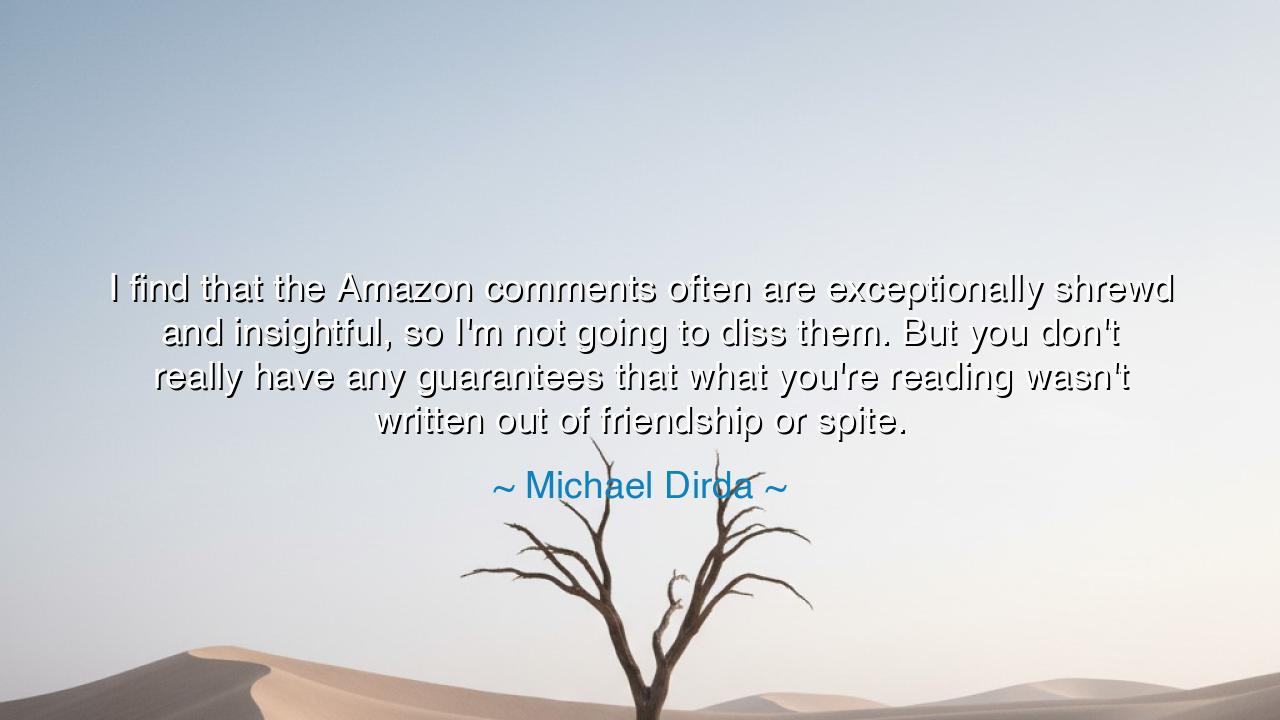
I find that the Amazon comments often are exceptionally shrewd
I find that the Amazon comments often are exceptionally shrewd and insightful, so I'm not going to diss them. But you don't really have any guarantees that what you're reading wasn't written out of friendship or spite.






In the great halls of ancient wisdom, there were sages who gathered to debate the truth—what was true, how it was known, and from where it sprang. The ancient philosophers often spoke of the need for discernment, to look beyond the surface and to question the motivations behind words, for truth can be easily swayed by emotion, bias, and friendship. Michael Dirda, in his contemplation of the Amazon comments, speaks of a modern conundrum that mirrors this age-old dilemma: "I find that the Amazon comments often are exceptionally shrewd and insightful, so I’m not going to diss them. But you don’t really have any guarantees that what you’re reading wasn’t written out of friendship or spite." These words remind us that, in every exchange, there are shadows that linger—motives that are not immediately clear, and judgments that must be carefully examined.
In the ancient days, advice and wisdom were passed down through trusted voices—elders, priests, and scholars—whose reputations had been earned through years of reflection and experience. The oracle of Delphi, for instance, spoke truths that were veiled in riddles, and yet these words were trusted, not just for their wisdom, but for the understanding that the oracle's motives were pure, guided by a divine hand. But even in such sacred places, the question of motivation arose. Were the oracle's words truly from the gods, or were they clouded by the human fallibility of the prophet? This question still reverberates today, as Dirda highlights the very same issue with the vast sea of reviews we now encounter on platforms like Amazon.
The dilemma Dirda articulates is one that speaks to the heart of human nature. As long as we are connected to one another, there will always be the risk that opinions and feedback are colored by personal feelings. A review, whether it be of a book, a product, or a person, is rarely entirely impartial. It is influenced by the reviewer’s experiences, biases, and, yes, their friendships and rivalries. Just as the philosophers of old warned of the dangers of rhetoric—of words used to manipulate or deceive—so too must we be wary today of the words we read in the ether of the internet. Are these reviews truly reflective of the value of a thing, or are they shaped by something less noble, like spite or affection?
Consider the court of King Solomon, where disputes were often resolved not by the obvious truth but by the subtleties of human nature. Two women claimed the same child, each insisting that it was hers. Solomon, known for his wisdom, did not immediately decide based on the evidence alone, but understood that human emotions—the desire for possession, the pull of motherly love—could cloud the truth. He wisely proposed to divide the child, knowing that the true mother would sacrifice her claim for the child’s safety. In a similar way, Dirda’s insight speaks to the need to navigate reviews with wisdom. We must understand that behind every word, there is a person, with their own emotions, biases, and desires that shape the very act of writing.
There is a profound lesson in this wisdom: always question the source, especially when the stakes are high. Whether it is a decision about what to read, what to buy, or what to believe, we must examine the context of the opinion we encounter. Just as the ancient philosophers urged their students to look beyond the surface, so too must we train ourselves to recognize that what we see may not always be the full picture. Just as Solomon sought the deeper truth beneath the surface of two competing claims, we must be vigilant and seek the deeper truths beneath the surface of every review.
Let this wisdom guide our actions in the modern world. In our lives, we too are bombarded by opinions, from friends, from strangers, and from voices in the great sea of technology. We must approach these opinions with caution, considering not just the words spoken, but the intentions behind them. Are they motivated by love? By hate? By a desire for attention or approval? In all things, the lesson remains the same: question the source. Trust the wisdom, but know the motive.
Thus, as we traverse this world of reviews, feedback, and opinions, let us keep our hearts open but our minds sharp. Let us not be easily swayed by flattery, nor easily broken by criticism. For in every voice, whether shrewd or insightful, there may lie hidden motives. And in recognizing this, we become the wise ones, able to discern the truth in a world full of opinions—guided not by friendship or spite, but by the light of discernment.






AAdministratorAdministrator
Welcome, honored guests. Please leave a comment, we will respond soon